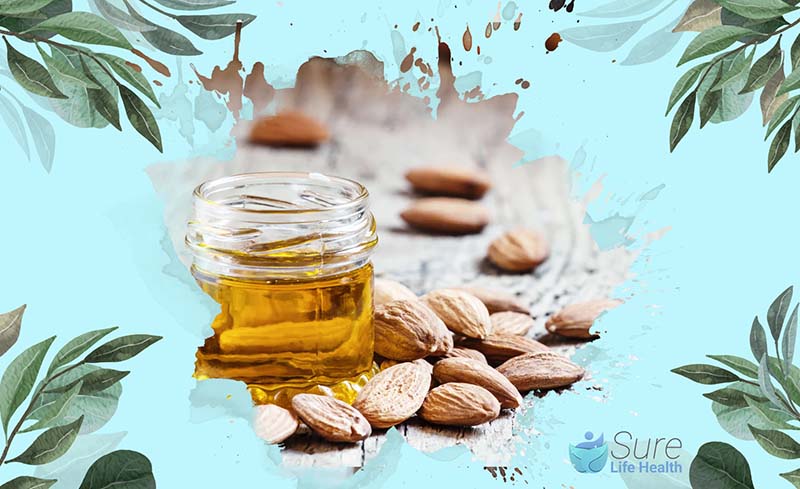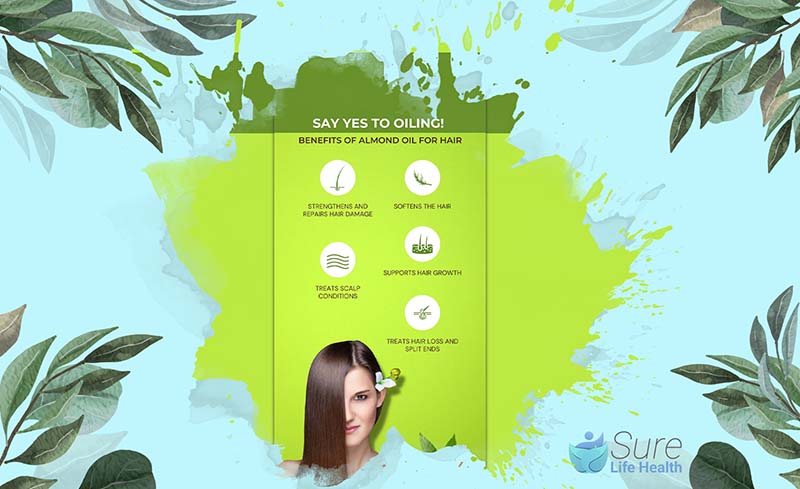“Is Almond Oil Good for Your Hair?” This question often arises when exploring natural remedies for enhancing hair health. Indeed, almond oil is celebrated for its ability to nourish and strengthen hair, offering a simple yet powerful solution for those seeking more luxurious locks.
In this post, we will explore how almond oil can improve your hair’s strength, increase its shine, and support overall health. Discover how incorporating this versatile oil into your routine can help you achieve beautiful, long hair.
Is Almond Oil Good for Your Hair?
Indeed, almond oil is highly beneficial for your hair, especially for its moisturizing and smoothing qualities. Extracted from the fruits of almonds (Prunus amygdalus), which are native to regions like the Middle East and South America, almond oil contains a rich mix of fatty acids such as oleic, linoleic, and palmitic acids, as well as a substantial amount of vitamin E.
Dermatology nurse practitioner Jodi LoGerfo emphasizes these components, highlighting the potential advantages of almond oil. Certified trichologist Kerry E. Yates also praises its effectiveness for hair and scalp, pointing out its natural antioxidant properties that offer protection and its enriching blend of vitamins, minerals, and fatty acids that condition the hair and skin.

4 Benefits of Almond Oil for Your Hair
Enhances Hair Health
Almond oil, enriched with vital vitamins like B7 and E carrying biotin, contributes to strengthening and repairing hair. The presence of antioxidants, particularly vitamin E, combats damage inflicted by free radicals, pollutants, chemicals, and heat.
Regular application of almond oil improves hair texture, combating dryness and brittleness, while also repairing hair structure from the roots.
Softens Your Hair
Acting as an emollient, almond oil contains essential fatty acids that effectively moisturize the scalp and strands, resulting in healthy, smooth hair with a soft texture.
Its regular usage penetrates deeply, softening the hair at the roots and taming frizz, ensuring a silky-smooth finish.
Treats Scalp Conditions
Almond oil, known for its antibacterial properties, serves as an effective remedy for various scalp issues. It is particularly useful for individuals prone to dandruff, as it helps rebalance the scalp’s microbial environment and targets the fungus and yeast that contribute to dandruff formation.
Additionally, the nourishing qualities of almond oil alleviate flakiness by loosening dead skin cells, making them easier to remove during washing.
Promotes Hair Growth
Regular oiling, especially with almond oil, stimulates hair growth by enhancing blood circulation to the follicles. This, in turn, strengthens the hair and promotes growth.
Additionally, the presence of biotin in almond oil aids in reactivating dormant follicles, promoting the production of keratin, essential for thickening and revitalizing thinning hair strands.

How Do You Use Almond Oil for Hair?
Almond Oil as a Finishing Oil
For a sleek finish and to manage unruly strands, almond oil is an excellent choice as a final touch after styling. This versatile oil is particularly effective in controlling baby hairs and small, loose strands that tend to stand out in humid conditions, all while adding a healthy shine to your hair.
To use, simply dispense a small amount of sweet almond oil onto your fingertips and gently smooth it along the lengths of your hair, pressing down any stray hairs as you go. This simple step will help keep your hair looking polished and neat.
Almond Oil as a Leave-in Conditioner
Incorporate the nourishing properties of almond oil into your hair care routine by using it as a leave-in conditioner. Here are the steps:
- Dispense a few drops of almond oil onto your palms.
- Apply it evenly to the mid-lengths and ends of damp hair, especially focusing on areas that are dry or damaged.
- Pay extra attention to the ends of your hair; if they appear overly dry or brittle, adjust the amount of oil accordingly.
- Leave the oil in your hair to provide nourishment and hydration. Be mindful not to use too much, as excessive oil can leave your hair looking greasy.

Almond Oil as a Hair Mask
Revitalize your hair with almond oil as a deeply nourishing hair mask. Follow these steps:
- Dispense a few drops of almond oil into the palm of your hand.
- Apply the oil to your hair, starting from the roots and working your way towards the tips.
- Massage the oil into your scalp and hair ends to stimulate circulation and ensure thorough distribution.
- For maximum benefits, allow the oil to penetrate your hair for an extended period, ideally overnight, before washing it out in the morning to reveal revitalized and nourished locks.
Are There Side Effects of Using Almond Oil on Hair?
Sweet almond oil is generally considered safe for hair and skin use, but certain individuals may need to exercise caution:
- Tree Nut Allergies: Individuals with tree nut allergies should refrain from using almond oil, as it could potentially trigger an allergic reaction.
- Acne-Prone Skin: Those with acne-prone skin, especially if other oils have caused breakouts, may want to avoid direct application of almond oil on the face. Almond oil has the potential to clog pores, leading to pimples and breakouts.
- Eye Area: While almond oil may offer benefits for eyelashes and eyebrows, it’s crucial to ensure that any product applied near the eyes is safe and free of contaminants to prevent irritation or adverse reactions. Always exercise caution and choose products specifically formulated for use in delicate areas.
Tips for Using Almond Oil for Hair Growth
Selecting the Ideal Almond Oil for Your Hair Type: To start your path to luxurious hair, choose the right almond oil based on your hair type. Those with fine hair should opt for pure, lightweight almond oil, which won’t weigh the hair down. If you have thicker or curly hair, look for almond oil blends or products that are enriched to meet the specific needs of your hair type.
Preparing Your Hair and Scalp for Almond Oil Treatment: Before applying almond oil, it’s crucial to prepare your hair and scalp to ensure they fully absorb the oil’s benefits. Begin with clean, dry hair. This helps the oil penetrate more effectively, maximizing the nourishing impact on your hair and scalp.
Get Creative with the Application: Embrace creativity when applying almond oil to fully experience its hair-nourishing benefits. Consider indulging in a deep-conditioning oil treatment by warming the oil and gently massaging it from roots to tips, allowing it to work its magic overnight. Alternatively, infuse almond oil into your favorite hair mask for a luxurious spa-like experience. Whether you opt for a massage or mix it with other products, almond oil offers a versatile solution for achieving a vibrant, head-turning mane.

Conclusion
Almond oil is a fantastic lightweight option that adds a subtle gloss and strength to your hair. However, achieving the best results with any beauty regimen requires consistency and minimizing stress on your hair. While almond oil may not produce dramatic effects like overnight hair growth, its effectiveness is well-supported by centuries of use in both Chinese and Ayurvedic medicine, both of which praise its ability to make hair irresistibly soft.
Although there are limited scientific studies, the enduring tradition of using almond oil highlights its potential benefits. So, if you’re asking, “Is almond oil good for your hair?” the answer is yes. Why not experience its wonders for yourself now?
Be sure to explore more insightful blogs from Sure Life Health, where we continue to shed light on the latest trends and breakthroughs in health and wellness.
Professor Gaye Cunnane, PhD, MB, FRCPI
As the Director of Health and Wellbeing at RCPI, Professor Gaye Cunnane is at the helm of initiatives aimed at enhancing the health and well-being of RCPI Trainers and Trainees. Her role extends beyond administration; she is also a respected clinical professor of rheumatology and a consultant rheumatologist at Trinity College Dublin (TCD) and St James’s Hospital. Prof. Cunnane’s medical journey began at TCD, where she graduated from medical school, and her path has been marked by both clinical and academic excellence.
After completing her basic clinical training in medicine, she embarked on PhD studies at University College Dublin and St Vincent’s University Hospital. Her research during this period was focused on prognostic markers in early inflammatory arthritis, a project that saw her collaborating with esteemed universities across Europe, including in Switzerland, The Netherlands, the UK, and Sweden.
Prof. Cunnane’s career took her to the University of California, San Francisco, where she spent three years delving into research on new treatments for lupus. Her academic prowess led her to the University of Leeds in 2001 as a senior lecturer, before returning to Ireland in 2003 to assume her current roles. She has also served as the National Specialty Director for Rheumatology training in Ireland, Programme Director for Basic Specialist Training with RCPI, and as a past President of the Irish Society for Rheumatology.
PUBLISHED ARTICLES
“Rheumatic disease differentiation using immunoglobulin G sugar printing by high-density electrophoresis”: Published in The Journal of Rheumatology, this study reflects her in-depth investigation into rheumatic diseases.
“Benefits of exercise in patients with rheumatoid arthritis: a randomized controlled trial”: This research work, highlighting the positive impact of exercise on rheumatoid arthritis, underscores Prof. Cunnane’s dedication to practical, patient-centered research.
Additionally, Prof. Cunnane has made notable contributions to the Annals of the Rheumatic Diseases, discussing early referral, diagnosis, and treatment of rheumatoid arthritis. She has also been involved in a study on the NCBI platform investigating exercise benefits in rheumatoid arthritis patients.
Professor Gaye Cunnane’s career is a testament to her commitment to improving patient outcomes in rheumatology through rigorous research, clinical excellence, and dedicated teaching. Her work continues to influence the field of rheumatology, both in Ireland and internationally.

